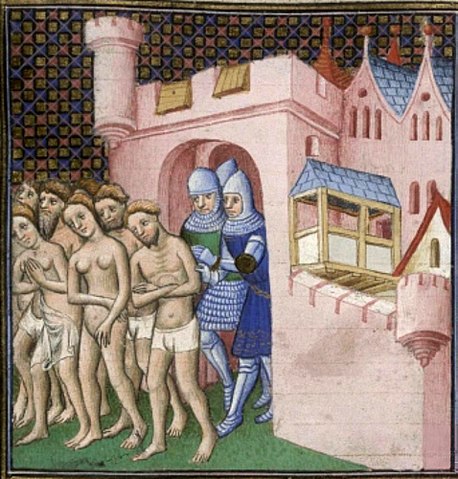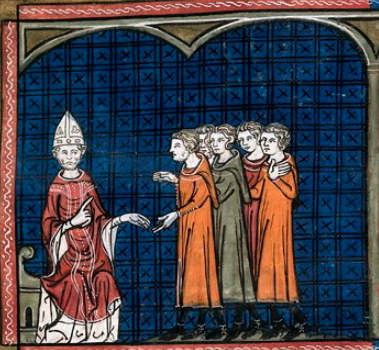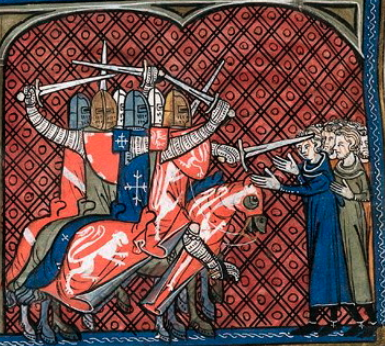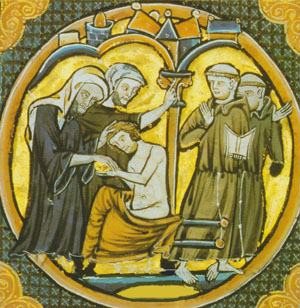Difference between revisions of "Cathar"
Occultwiki (talk | contribs) |
Occultwiki (talk | contribs) |
||
| (One intermediate revision by the same user not shown) | |||
| Line 55: | Line 55: | ||
===Sexual beliefs=== | ===Sexual beliefs=== | ||
Cathars believed that the sexual allure of women impeded a man's ability to reject the material world. Despite this stance on sex and reproduction, some Cathar communities made exceptions. In one version, the Invisible Father had two spiritual wives, Collam and Hoolibam (identified with Oholah and Oholibah), and would himself have provoked the war in heaven by seducing the wife of Satan, or perhaps the reverse. Cathars adhering to this story would believe that having families and sons would not impede them from reaching [[Yahweh|God]]'s kingdom. | Cathars believed that the sexual allure of women impeded a man's ability to reject the material world. Despite this stance on sex and reproduction, some Cathar communities made exceptions. In one version, the Invisible Father had two spiritual wives, Collam and Hoolibam (identified with Oholah and Oholibah), and would himself have provoked the war in [[heaven]] by seducing the wife of [[Satan]], or perhaps the reverse. Cathars adhering to this story would believe that having families and sons would not impede them from reaching [[Yahweh|God]]'s kingdom. | ||
The Cathars ate a pescatarian diet. They did not eat cheese, eggs, meat, or milk because these are all by-products of sexual intercourse. The Cathars believed that animals were carriers of reincarnated souls, and forbade the killing of all animal life, apart from fish, which they believed were produced by spontaneous generation. | The Cathars ate a pescatarian diet. They did not eat cheese, eggs, meat, or milk because these are all by-products of sexual intercourse. The Cathars believed that animals were carriers of reincarnated souls, and forbade the killing of all animal life, apart from fish, which they believed were produced by spontaneous generation. | ||
==Legacy of Catharism== | ==Legacy of Catharism== | ||
The Cathars could be seen as prefiguring Protestantism in that they denied transubstantiation, purgatory, prayers for the dead and prayers to [[saint]]s. They also believed that the scriptures should be read in the vernacular. 20th century Baptists have argued that the Cathars are part of Baptist successionism; placing the Cathars as forerunners of Baptist theology. | The Cathars could be seen as prefiguring Protestantism in that they denied transubstantiation, [[purgatory]], prayers for the dead and prayers to [[saint]]s. They also believed that the scriptures should be read in the vernacular. 20th century Baptists have argued that the Cathars are part of Baptist successionism; placing the Cathars as forerunners of Baptist theology. | ||
There is academic controversy about whether Catharism was a real and organized movement or whether the medieval Church imagined or exaggerated it. The lack of any central organization among Cathars, regional differences in beliefs and practices, as well as the lack of sources from the Cathars themselves has prompted some scholars to question whether Catharism existed. Other scholars say that there is evidence of the existence of Catharism, and also evidence that the threat of it was exaggerated by its persecutors in the Church. Since the 1990s, some scholars have regarded the fear of Cathars as a moral panic. | There is academic controversy about whether Catharism was a real and organized movement or whether the medieval Church imagined or exaggerated it. The lack of any central organization among Cathars, regional differences in beliefs and practices, as well as the lack of sources from the Cathars themselves has prompted some scholars to question whether Catharism existed. Other scholars say that there is evidence of the existence of Catharism, and also evidence that the threat of it was exaggerated by its persecutors in the Church. Since the 1990s, some scholars have regarded the fear of Cathars as a moral panic. | ||
Latest revision as of 17:44, 19 November 2024
Catharism was a Christian dualist or Gnostic movement between the 12th and 14th centuries which thrived in Southern Europe, particularly in northern Italy and southern France. Followers were described as Cathars and referred to themselves as Good Christians; in modern times, they are mainly remembered for a prolonged period of mutual conflict and religious persecution – sometimes regarded as genocide – by the Catholic Church which deemed Catharism a heretical sect.
In the Languedoc and northern Italy, the Cathars attained their greatest popularity, surviving in the Languedoc, in much reduced form, up to around 1325 and in the Italian cities until the Inquisitions of the 14th century finally extirpated them.
Name
Though the term Cathar (/ˈkæθɑːr/) has been used for centuries to identify the movement, whether it identified itself with the name is debated. In Cathar texts, the terms Good Men (Bons Hommes), Good Women (Bonnes Femmes), or Good Christians (Bons Chrétiens) are the common terms of self-identification.
Texts
The alleged sacred texts of the Cathars, besides the New Testament, included the Bogomil text The Gospel of the Secret Supper, a modified version of Ascension of Isaiah, and the Cathar original work The Book of the Two Principles (possibly penned by Italian Cathar John Lugio of Bergamo). They regarded the Old Testament as written by Satan, except for a few books which they accepted, and considered the Book of Revelation not a prophecy about the future, but an allegorical chronicle of what had transpired in Satan's rebellion. Their reinterpretation of those texts contained numerous elements characteristic of Gnostic literature.
Only a few texts of the Cathars remain, as preserved by their opponents (such as the Rituel Cathare de Lyon) which give a glimpse into the ideologies of their faith. One large text has survived, The Book of Two Principles (Liber de duobus principiis), which elaborates the principles of dualistic theology from the point of view of some Albanenses Cathars.
Origins
The origins of the Cathars' beliefs are unclear, but most theories agree they came from the Byzantine Empire, mostly by the trade routes and spread from the First Bulgarian Empire to the Netherlands. John Damascene, writing in the 8th century AD, also notes of an earlier sect called the "Cathari," in his book On Heresies, taken from the epitome provided by Epiphanius of Salamis in his Panarion.
Identifiable historical Catharism did not emerge until at least 1143, when the first confirmed report of a group espousing similar beliefs is reported being active at Cologne by the cleric Eberwin of Steinfeld. A landmark in the "institutional history" of the Cathars was the Council, held in 1167 at Saint-Félix-Lauragais, attended by many local figures and also by the Bogomil papa Nicetas, the Cathar bishop of (northern) France and a leader of the Cathars of Lombardy.
History
The historical record of the Cathars is derived primarily from their opponents.
Catharism emerged in Western Europe in the Languedoc region of southern France in the 11th century. Adherents were sometimes referred to as Albigensians, after the French city Albi where the movement first took hold. Catharism was initially taught by ascetic leaders who set few guidelines, leading some Catharist practices and beliefs to vary by region and over time. The movement was greatly influenced by the Bogomils of the First Bulgarian Empire, and may have originated in the Byzantine Empire, namely through adherents of the Paulician movement in Armenia and eastern Anatolia who were resettled in Thrace (Philippopolis).
The Catholic Church denounced Cathar practices, particularly the consolamentum ritual. From the beginning of his reign, Pope Innocent III attempted to end Catharism by sending missionaries and persuading the local authorities to act against them. In 1208, Pierre de Castelnau, Innocent's papal legate, was murdered while returning to Rome after excommunicating Count Raymond VI of Toulouse, who, in his view, was too lenient with the Cathars. Pope Innocent III then abandoned sending Catholic missionaries and jurists, declared Pierre de Castelnau a martyr and launched the Albigensian Crusade in 1209.
Massacre at Béziers
The Cathars spent much of 1209 fending off the crusaders. The Béziers army attempted a sortie but was quickly defeated, then pursued by the crusaders back through the gates and into the city. Arnaud-Amaury, the Cistercian abbot-commander, is supposed to have been asked how to tell Cathars from Catholics. His reply, recalled by Caesarius of Heisterbach, a fellow Cistercian, thirty years later was "Caedite eos. Novit enim Dominus qui sunt eius" ("Kill them all, the Lord will recognise His own").
The doors of the church of St Mary Magdalene were broken down and the refugees dragged out and slaughtered. Reportedly, at least 7,000 men, women and children were killed there by Catholic forces. Elsewhere in the town, many more thousands were mutilated and killed. Prisoners were blinded, dragged behind horses, and used for target practice. What remained of the city was razed by fire. Arnaud-Amaury wrote to Pope Innocent III, "Today your Holiness, twenty thousand heretics were put to the sword, regardless of rank, age, or sex."
Annihilation
After several decades of harassment and re-proselytising, and, perhaps even more important, the systematic destruction of their religious texts, the sect was exhausted and could find no more adepts. The leader of a Cathar revival in the Pyrenean foothills, Peire Autier, was captured and executed in April 1310 in Toulouse. After 1330, the records of the Inquisition contain very few proceedings against Cathars. The last known Cathar perfect in the Languedoc, Guillaume Bélibaste, was executed in the autumn of 1321.
After the suppression of Catharism, the descendants of Cathars were discriminated against and at times required to live outside towns and their defences. They retained their Cathar identity, despite their reintegration into Catholicism.
Beliefs
Cathar ideology continues to be debated, with commentators regularly accusing opposing perspectives of speculation, distortion and bias.
Among the most notable and controversial beliefs of the Cathars was the idea of two gods or deistic principles, one good and the other evil. The Catholic Church asserted this was antithetical to monotheism, a fundamental principle that there is only one God, who created all things visible and invisible, as stated in the Nicene Creed. Cathars believed that the good God was the God of the New Testament, creator of the spiritual realm, whereas the evil God was the God of the Old Testament, creator of the physical world whom many Cathars identified as Satan. The latter, often called Rex Mundi ("King of the World"),[23] was identified as the God of Judaism, and was also either conflated with Satan or considered Satan's father, creator or seducer.
Cathars believed human spirits were the sexless spirits of angels trapped in the material realm of the evil god, destined to be reincarnated until they achieved salvation through the consolamentum, a form of baptism performed when death is imminent, when they would return to the good God as "Perfect." The Cathars taught that to regain angelic status one had to renounce the material self completely. Until one was prepared to do so, they would be stuck in a cycle of reincarnation, condemned to suffer endless human lives on the corrupt Earth.
Beliefs concerning Jesus Christ
Cathars venerated Jesus Christ and followed what they considered to be his true teachings, labelling themselves as "Good Christians." However, they denied his physical incarnation and Resurrection. Authors believe that their conception of Jesus resembled docetism, believing him the human form of an angel, whose physical body was only an appearance. This illusory form would have possibly been given by the Virgin Mary, another angel in human form, or possibly a human born of a woman with no involvement of a man.
They firmly rejected the Resurrection of Jesus, seeing it as representing reincarnation, and the Christian symbol of the cross, considering it to be not more than a material instrument of torture and evil. They also saw John the Baptist, identified also with Elijah, as an evil being sent to hinder Jesus's teaching through the false sacrament of baptism. For the Cathars the "resurrection" mentioned in the New Testament was only a symbol of re-incarnation.
Most Cathars did not accept the normative Trinitarian understanding of Jesus. Some communities might have believed in the existence of a spirit realm created by the good God, the "Land of the Living," whose history and geography would have served as the basis for the evil god's corrupt creation. Under this view, the history of Jesus would have happened roughly as told, only in the spirit realm. The physical Jesus from the material world would have been evil, a false messiah and a lustful lover of the material Mary Magdalene. However, the true Jesus would have influenced the physical world in a way similar to the Harrowing of Hell, only by inhabiting the body of Paul.
Enochian view
Some Cathars told a version of the Enochian narrative, according to which Eve's daughters copulated with Satan's demons and bore giants. The Deluge would have been provoked by Satan, who disapproved of the demons revealing he was not the real god, or alternatively, an attempt by the Invisible Father to destroy the giants. The Holy Spirit was sometimes counted as one single entity, but to others it was considered the collective groups of unfallen angels who had not followed Satan in his rebellion.
Sexual beliefs
Cathars believed that the sexual allure of women impeded a man's ability to reject the material world. Despite this stance on sex and reproduction, some Cathar communities made exceptions. In one version, the Invisible Father had two spiritual wives, Collam and Hoolibam (identified with Oholah and Oholibah), and would himself have provoked the war in heaven by seducing the wife of Satan, or perhaps the reverse. Cathars adhering to this story would believe that having families and sons would not impede them from reaching God's kingdom.
The Cathars ate a pescatarian diet. They did not eat cheese, eggs, meat, or milk because these are all by-products of sexual intercourse. The Cathars believed that animals were carriers of reincarnated souls, and forbade the killing of all animal life, apart from fish, which they believed were produced by spontaneous generation.
Legacy of Catharism
The Cathars could be seen as prefiguring Protestantism in that they denied transubstantiation, purgatory, prayers for the dead and prayers to saints. They also believed that the scriptures should be read in the vernacular. 20th century Baptists have argued that the Cathars are part of Baptist successionism; placing the Cathars as forerunners of Baptist theology.
There is academic controversy about whether Catharism was a real and organized movement or whether the medieval Church imagined or exaggerated it. The lack of any central organization among Cathars, regional differences in beliefs and practices, as well as the lack of sources from the Cathars themselves has prompted some scholars to question whether Catharism existed. Other scholars say that there is evidence of the existence of Catharism, and also evidence that the threat of it was exaggerated by its persecutors in the Church. Since the 1990s, some scholars have regarded the fear of Cathars as a moral panic.
In popular culture, Catharism has been linked with the Knights Templar, an active sect of monks founded during the First Crusade (1095–1099). This link has caused fringe theories about the Cathars and the possibility of their possession of the Holy Grail, such as in the pseudohistorical book The Holy Blood and the Holy Grail.
Zoé Oldenbourg compared the Cathars to "Western Buddhists" because she considered that their view of the doctrine of "resurrection" taught by Jesus Christ was similar to the Buddhist doctrine of rebirth.



